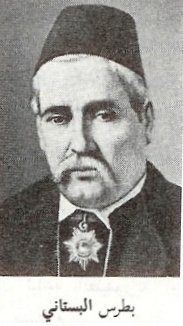
Butrus al-Bustani
Encyclopedia

Lebanon
Lebanon , officially the Republic of LebanonRepublic of Lebanon is the most common term used by Lebanese government agencies. The term Lebanese Republic, a literal translation of the official Arabic and French names that is not used in today's world. Arabic is the most common language spoken among...
.
Life
Al-Bustani was born to a Maronite Christian family in the village of Dibbiye in the Chouf region, in January 1819. He received primary education in the village school, where he attracted the attention of his teacher, Father Mikhail al-Boustani, because of his keen intelligence that he showed brilliantly.The latter recommended him to the Bishop of Sidon
Sidon
Sidon or Saïda is the third-largest city in Lebanon. It is located in the South Governorate of Lebanon, on the Mediterranean coast, about 40 km north of Tyre and 40 km south of the capital Beirut. In Genesis, Sidon is the son of Canaan the grandson of Noah...
and Beiteddine, Abdullah al-Bustani, who sent him at the age of 11 to the school at ‘Ayn Warqa, the most famous school of that period, to continue his studies there. At ‘Ayn Waraqa he learned Syriac and Latin.
He spent ten years there and learned several foreign languages including French, Italian and English.
While working to translate the Bible, al-Bustani learned Hebrew, Aramaic and Greek, and perfected Syriac and Latin.
In Beirut he came into contact with the American Protestant missionaries with whom he worked closely until his death on May 1, 1883.
Achievements
In the social, national and political spheres, he founded associations with a view to forming a national élite and launched a series of appeals for unity in his magazine Nafir Suriya.In the educational field, he taught in the schools of the Protestant missionaries at ‘Ubey before founding his own National School in 1863 on secular principles. At the same time, he compiled and published several school textbooks and dictionaries to become known famously as the Master and Father of the Arabic Renaissance.
In the cultural/scientific fields, he published a fortnightly review, two daily newspapers and an encyclopedia Al-Muhit al Muhit (The ocean of oceans), the first Arabic encyclopedia. In addition to these activities, he began work, together with Drs Eli Smith
Eli Smith
Eli Smith was an American Protestant Missionary and scholar, born at Northford, Conn. He graduated from Yale in 1821 and from Andover Theological Seminary in 1826. He worked in Malta until 1829, then in company with H. G. O. Dwight traveled through Armenia and Georgia to Persia. They published...
and Cornelius Van Dyck of the American Mission, on a translation of the Bible into Arabic known as the Smith-Van Dyke translation.
He is best known for creating the first modern Arabic
Arabic language
Arabic is a name applied to the descendants of the Classical Arabic language of the 6th century AD, used most prominently in the Quran, the Islamic Holy Book...
encyclopedia
Encyclopedia
An encyclopedia is a type of reference work, a compendium holding a summary of information from either all branches of knowledge or a particular branch of knowledge....
, Muhit al Muhit (The ocean of oceans), and founding the National School in Beirut.
His prolific output and groundbreaking work led the creation of modern Arabic expository prose. While educated by westerners and a strong advocate of western technology, he was a fierce secularist, playing a decisive role in formulating the principles of Syrian nationalism
Syrian nationalism
Syrian nationalism refers to the nationalism of Syria, or the Fertile Crescent as a cultural or political entity. It should not be confused with the Arab nationalism that is the official state doctrine of the Syrian Arab Republic's ruling Baath Party, nor should it be assumed that Syrian...
(not to be confused with Arab nationalism
Arab nationalism
Arab nationalism is a nationalist ideology celebrating the glories of Arab civilization, the language and literature of the Arabs, calling for rejuvenation and political union in the Arab world...
).
Works on Education
- 'Discourse on Education Given at the National School.' In: Al-Jinan (Beirut), no. 3, 1870.
- 'The National School.' In: Al-Jinan (Beirut), no. 18, 1873.
- 'Discourse on Science among the Arabs', Beirut, 15 February 1859.
- 'Discourse on the Education of Women', given in 1849 at the meeting of members of the Syrian Association and published in the Actes de l'Association syrienne, Beirut, 1852.
- 'Discourse on Social Life', Beirut, 1869.
- Boutros al-Boustani. Textes choises. With a commentary by Fouad Ephrem al-Boustani. Beirut, Publications de l'Institut des Lettres Orientales, 1950. (Collection Al Rawai')
- The writings and speeches of Butrus al-Bustani, either in published or manuscript form, are preserved in the 'Yafeth' Library at the American University of Beirut and available to readers and researchers.

